The Best Movies of 2025 (So Far)
With the summer movie season winding down, we catch our breath and look back on the best films of 2025 so far, from Sinners to Superman and everything in between.
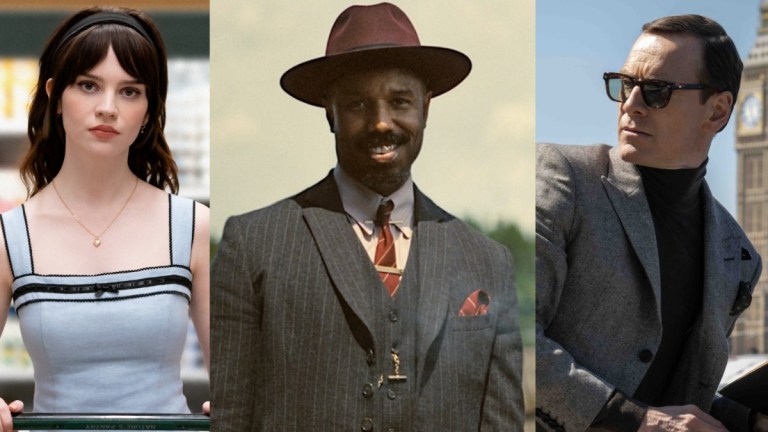
Sunlight still lasts until late into the evening, and temperatures on the east coast of the U.S. remain reliably sweltering. The dog days of summer are definitely here. Even so, the summer movie season is winding down. Indeed, the biggest superhero film of the season is already on streaming as of press time, and studios have entered the lull that begins sometime around mid-August and lasts until the awards season proper picks up next month.
It is for this reason that we at Den of Geek tend to wait a little bit later than the middle of the year in June to do what amounts to a temperature check. While July might mark the beginning of the back half of the year, the cinematic calendar tends to have a stronger demarcation between “summer” and “after summer.” With that said, there have been a number of excellent films released both during the balmy months and well before. We have thus rounded up for your perusal in alphabetical order the best movies of 2025. So far.
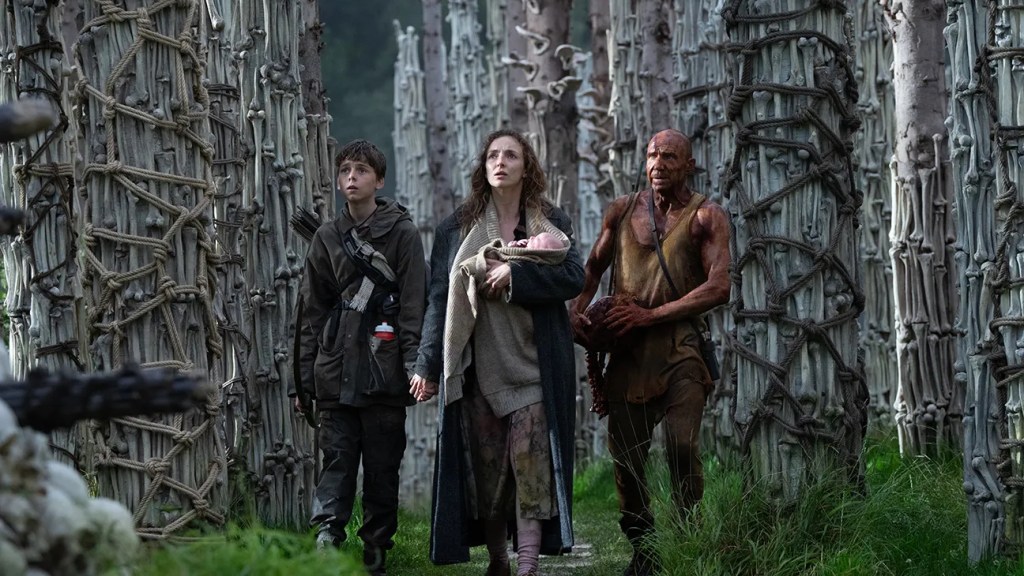
28 Years Later
Some things get better with age, and that includes Danny Boyle and Alex Garland’s creative partnership. While not quite 28 years from the moment they reinvented the zombie genre with the indie breakout 28 Days Later, it’s still been more than two decades since the director and screenwriter have galloped alongside their rage-infected zombies. And to 28 Years Later’s defiant credit, it opens with a bombastic throwback to indie 2000s cinema that is every bit as frenzied as Boyle’s early work.
The most impressive thing about 28 Years Later, however, is what comes afterward. Proving they can conjure youthful rage when it counts, Boyle and Garland quickly pivot to use their post-apocalyptic UK to grapple with more eternal themes like mortality and recognizing the difference between a death with dignity and one without. At times 28 Years Later resembles a folk horror movie with its medieval trappings and beatific agrarian setting. There is still an indictment of the modern world here, particularly in a post-Brexit context, but this is a movie about loss, grief, and finally forming a good life. That holds doubly true in any scene that allows Jodie Comer or Ralph Fiennes the time to dominate the frame simply by living in it.
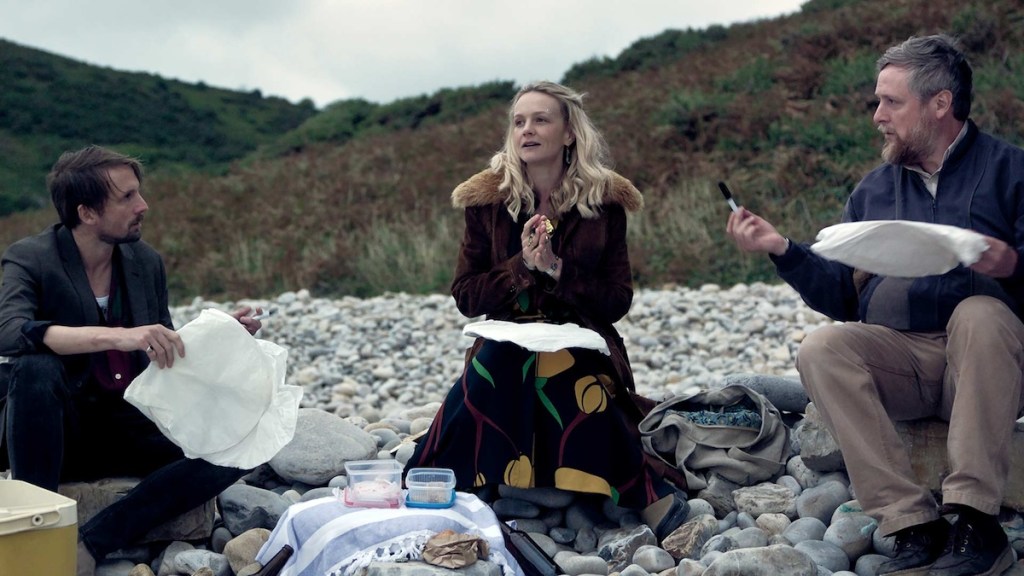
The Ballad of Wallis Island
Director James Griffiths and stars/writers Tom Basden and Tim Key previously made a version of The Ballad of Wallis Island as a short film in 2007. Waiting nearly two decades to turn the concept into a feature proved apropos for the wistful dramedy. While on the one hand this movie works as a satire of many a creative’s worst fear—being trapped on an isolated island with a worshipful fan—on the other it is a far more deliberate meditation on the music and cultural touchstones that shape us… and how those touchstones can become anchors dragging at our feet.
Such is the alternating lifestyles of both folk singer Herb McGwyer (Basden) and eccentric millionaire Charles Heath (Key). Charles has invited Herb to play an intimate concert of old 2000s hits for longtime fans on a hard-to-get-to island. Only when Herb arrives though does he discover the intimate audience consists of one lonely fan: Charles. Also Charlie invited Herb’s ex-girlfriend and achingly missed collaborator, the now married Nell Mortimer (Carey Mulligan) too. It’s a setup that can go many ways, and yet all of the collaborators, including a warmly elegiac Mulligan, take it to a place that is never anything less than amusing and cozy. Still, even warmth can burn. Sometimes you can’t go home, but if you do make sure there’s an exit strategy that is not dependent on the ebbing of the tide.

Black Bag
More than one cynic has observed that marriages can be cold wars. Few though actually come with literal government surveillance equipment and the potential for a body count. If that sounds extreme, then you absolutely must meet George Woodhouse and Kathryn St. Jean, Michael Fassbender and Cate Blanchett’s fascinating MI6 power couple in Steven Soderbergh’s slippery Black Bag. Benefitting from an erudite and underhanded screenplay by David Koepp (who hasn’t been this playful in years), Black Bag is a throwback to a time when sharp thrillers could be seen as date night entertainment for adults who like their thrills served in a frosted glass.
Black Bag even begins with the dinner party from hell where the divinely played George and Kathryn invite all their coworkers in espionage, including a showy ensemble with Regé-Jean Page, Naomie Harris, Tom Burke, and Marisa Abela, to dinner. Unbeknownst to the guests though is that George slipped some truth serum into the roast. It certainly makes for lively table conversation. It also acts as an opening salvo for a story about risks that come with trust, loyalty, and knowing your partner, even in a setting where the stakes are no less high than treason and summary execution.
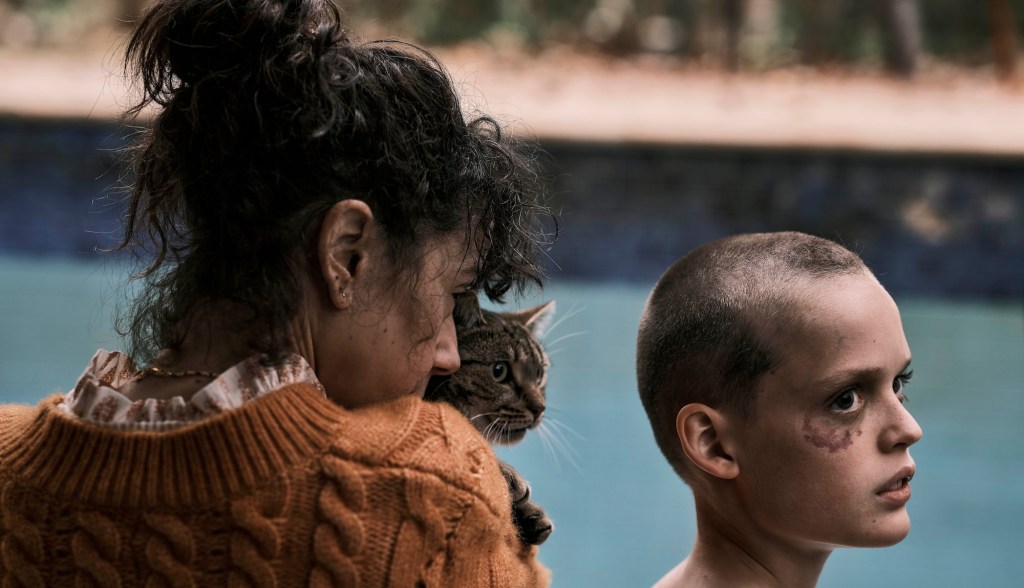
Bring Her Back
If you ever have the pleasure to meet Danny and Michael Philippou, Australian twin brothers who are also known by their YouTube handle of RackaRacka, you’ll likely be charmed by their sunny optimism and joie de vivre. Which makes their two incredibly nihilistic horror movies to date, Talk to Me and now Bring Her Back, all the more curiously bleak. Like their feature debut, Bring Her Back uses horror tropes and demonic imagery to dive into the most despairing corners of doubt and grief, and in this case as it relates to a parent and child.
Take Sally Hawkins’ Laura for instance, a gregarious and extroverted foster mother who seems to take sincere interest in Andy (Billy Barrett) and Piper (Sora Wong). Andy and Piper are step-siblings turned orphans. They also genuinely look after one another, with Piper and the actor playing her both being visually impaired. So that makes the horror they’re about to be put through by a guardian who is herself unable to let go of the memory of a child she lost all the more insidious, even before demonology and ritualistic incantations emerge. Beyond horror trappings, it’s the naked vulnerability on display in the Philippous’ screenplay, as well as a ferocious turn by Hawkins, who in turn channels Bette Davis in Whatever Happened to Baby Jane?, that makes Bring Her Back immersive to the point of asphyxiation.
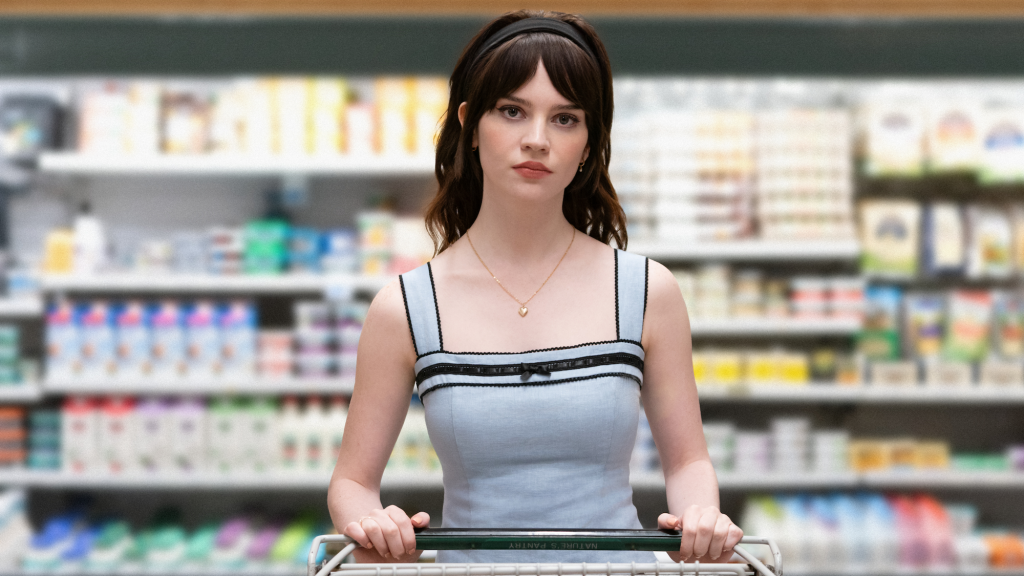
Companion
Something of a spiritual sequel to The Stepford Wives (others might also say a correction), Drew Hancock’s Companion kicked off a strong year for horror with this mirthful and pleasantly merciless satire. Told from the perspective of an android with a heart of gold named Iris (Sophie Thatcher), Companion not only takes on the side of synthetics, but also shrewdly diagnoses humanity as probably unworthy of saving. Jack Quaid certainly has a ball personifying modern day incel entitlement as Josh, the manosphere louse who rented Iris to be his sentient sex doll until he grew bored.
The plot gets a little more complex than you might expect from there, but through all the twists and turns Hancock reveals a canny ear for comedy and a firm grip on tone as Companion dances between science fiction, heist movie antics, and finally feminist horror emancipation. After making a splash in the genre in last year’s Heretic, Thatcher also confirms she will be a mainstay with a bubbly performance so brimming with life that it even got a bunch of entertainment writers to sympathize with the AI.
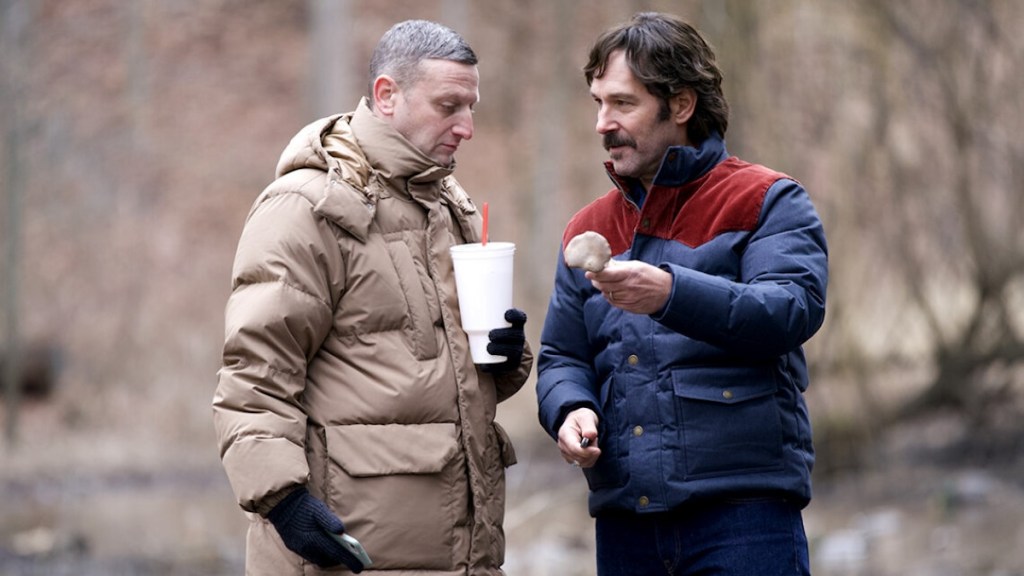
Friendship
Tim Robinson’s brand of comedy can be an acquired taste. Reliant on evoking cringes until your muscles hurt, his gags have always been punishingly cruel. Now that sadism has been elevated to a joyous place in Friendship, a new laugher written and directed by Andrew DeYoung that gets a lot of mileage out of our familiarity with Paul Rudd. After all, Paul Rudd is a cool dude, and his onscreen Austin is indeed the coolest with his Anchorman-era ‘stache and I Love You Man smile.
But it’s only after audiences are encouraged to recognize Robinson’s needy and pathetic Craig is more than just a clinger, but also a kind of milquetoast 2020s Travis Bickle, that the penny drops. Friendship is a comedy told from the delusional perspective of the villain, so watching him destroy his marriage to Kate Mara, his heinous job at a parasitic tech company, and eventually even his bromance with Rudd takes on a biblical degree of schadenfreude. Also just wait for the toad glands scene.
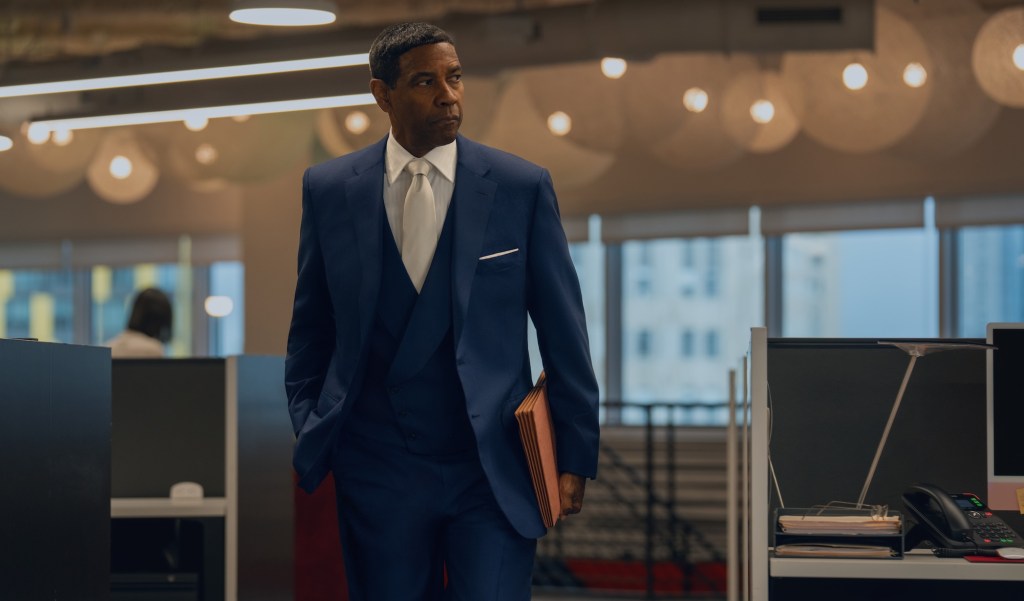
Highest 2 Lowest
Akira Kurosawa has remained one of the most malleable and influential filmmakers when it comes to adapting and reimagining his works for other cultures. From The Magnificent Seven to A Fistful of Dollars, to even Bill Nighy’s under-appreciated gem from a few years ago, Living, the Japanese master has inspired many great films in the West (and to be fair was himself not immune from painting the works of William Shakespeare in samurai red). So it is that one of Kurosawa’s less flashy efforts, the 1960s-set ransom thriller High and Low, has proven fertile ground to plant a deeply Americanized and New York-centric Spike Lee joint: Highest 2 Lowest.
The story of a magisterial music executive (Denzel Washington) who sees his kingdom threatened when envious eyes think they have kidnapped his son—but instead snatch the teenage child of Washington’s BFF and ostensible valet (Jeffrey Wright)—Highest 2 Lowest is a throwback thriller and morality tale about the choices that define a soul. Yet the film also marks the fifth collaboration between Lee and Washington, and arguably their most potent since Malcolm X 33 years ago. In this context, the film takes on a seemingly personal quality about the expectations placed on Black artists by a world that thinks it has ownership over their talent and attention. It’s a trenchant, brooding work filled with self-examination and, perhaps, accusation.
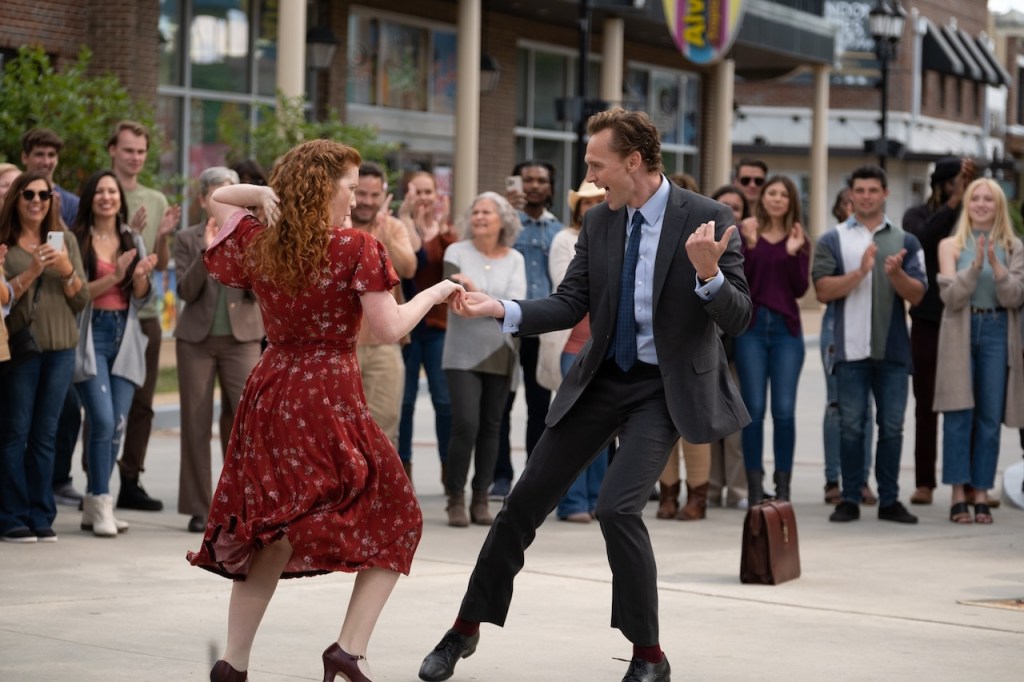
The Life of Chuck
Stephen King is an author usually celebrated for his gift for suspense and terror. Yet his constant readers know him just as well for the ebullient humanism and moral certitude he laces throughout most of his writing. It seems safe to say that writer-director Mike Flanagan can be counted as one of those devoted admirers. The filmmaker already has given us the best King adaptations made in this century, including Gerald’s Game and Doctor Sleep. Now The Life of Chuck can be added to that list. Like Rob Reiner and Frank Darabont before him, Flanagan has picked up one of King’s less well-known tales or short stories that is only the sentimentality and none of the pesky horror crowbarred in. It’s entirely the “good vibes,” even with its enigmatic mystery set at the end of the world.
Seriously though, the apocalypse does seem to be nigh in one of the film’s disparate vignettes where disasters around the globe are said to be occurring. But Flanagan nor Life of Chuck, give them any mind while focusing on the failed, but nonetheless enduring, marriage of Marty (Chiwetel Ejiofor) and ex-wife Felicia (Karen Gillan). How this narrative threads with other chapters about a handful days in the life of a mild mannered accountant named Chuck (Tom Hiddleston, Benjamin Pajak, and Jacob Tremblay, depending on the sequence) is perhaps the biggest mystery of all. But the logic of the narrative is far less important than the emotional truth it evokes every time one of the Chucks gives into the ache in his heart, or the twinkle in his toes.
It really is the most winsome crowdpleaser one can see this year and deserves a far larger audience.
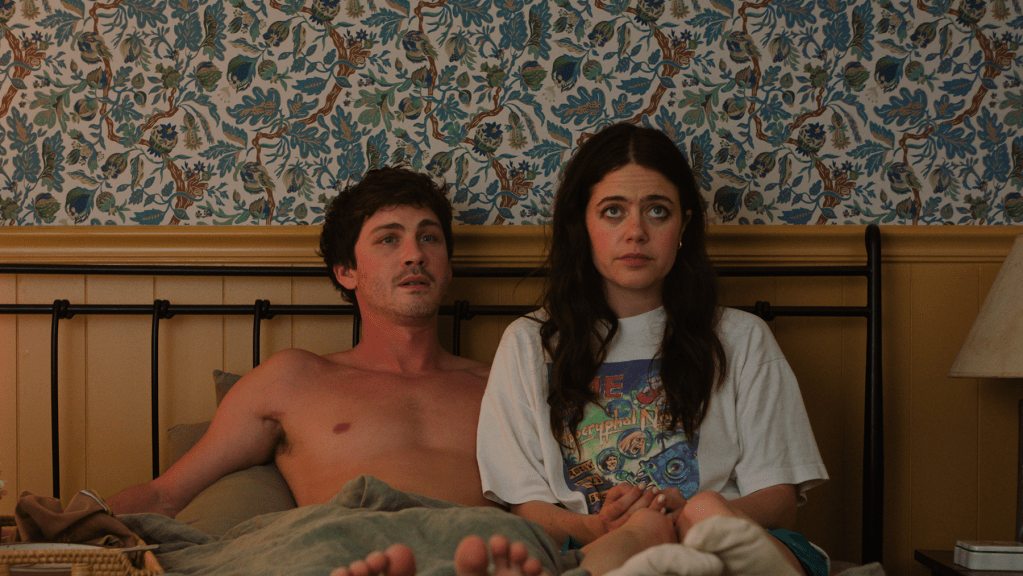
Oh, Hi!
Never let the necessity of a safe word and clearly defined boundaries be underestimated. Iris and Isaac (Molly Gordon and Logan Lerman) could use more of both in Oh, Hi!, a light but charming comedy from director Sophie Brooks, working from a script she co-wrote with Gordon. Caught in a cautionary tale of dating don’ts, Iris and Isaac are on their first romantic getaway out of the city when the pair decide on the spur of the moment to dabble in some light BDSM after discovering handcuffs in their AirBNB.
Unfortunately it is only while tied up that Isaac makes the insensitive choice to admit he never thought they were a couple, even in spite of the fact that they’re on a weekend holiday with red wine and sautéed scallops. Iris in turn makes the rash decision to not unbound her non-beau until they can, uh, talk things out. A kind of millennial parable about mixed signals and the worst case scenarios derived from sexual misadventure, Oh, Hi! is a bemusing rom-com of a frothy sort. It’s narrative rough edges are smoothed out by a game cast, including Geraldine Viswanathan and John Reynolds as two friends roped into the high-concept crucible, and an ultimately earnest meditation about the pitfalls of leaving yourself exposed to the world, figuratively and literally.
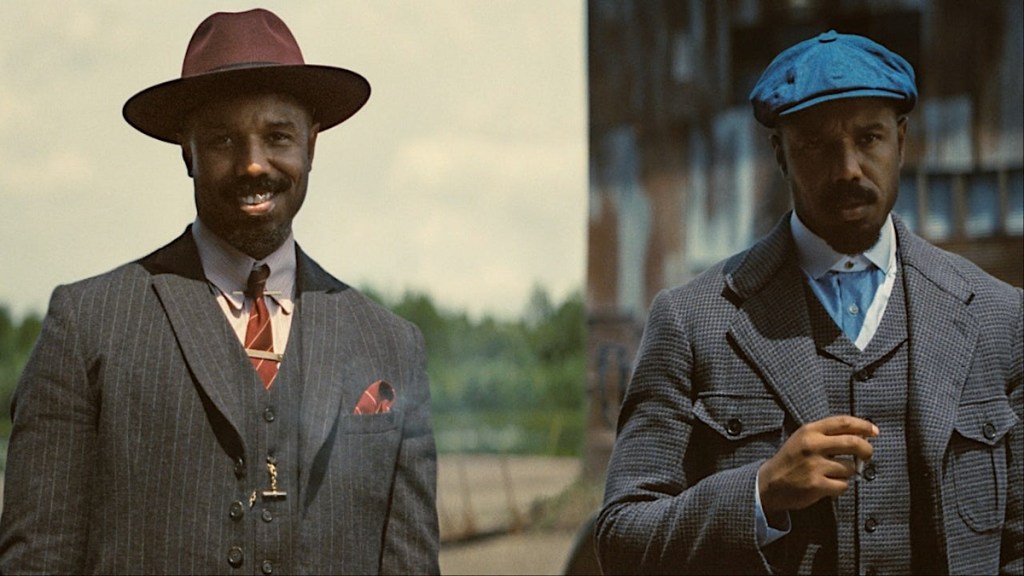
Sinners
It is still hard to fathom why so many prognosticators second-guessed Ryan Coogler going all-in on an original horror movie via Sinners. More than once Coogler has proven to be a storyteller with superb instincts for marrying artistry with commercial affability, as seen in his soulful work in franchise films like Creed and Black Panther. Still, Sinners is Coogler unchained from IP, fan expectation, or anything but his own muses—which when captured in stunning IMAX 65mm photography proved to be the stuff of blockbuster legend.
Simply the way Coogler films rolling fields of cotton in Jim Crow and Depression era Mississippi alone is poignant enough to be worth the price of admission. Pulling acutely from his own family history, as well as the Southern folklore and mythology entwined with the origin of the blues, Coogler takes pulpy genre elements like vampires and bootleggers with itchy trigger fingers and uses them to buttress a larger narrative about the transcendent and everlasting power of Black art to endure, connecting culture with its future and past simultaneously. One magnificent interlude in particular, which occurs when Miles Caton picks up his guitar at a juke joint, carries the movie to a special rarified space. It’s also supremely entertaining to digest all that in a movie where Michael B. Jordan dons dueling fedoras, tommy guns, and Southern accents.
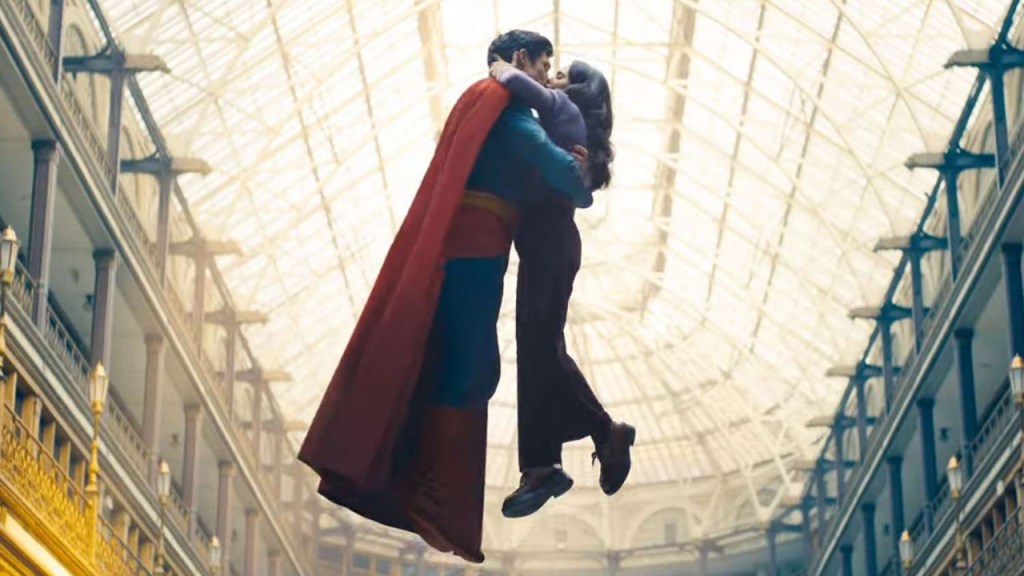
Superman
The oldest superhero in the canon has inexplicably proven the most difficult to adapt in the modern age. Various directors, showrunners, and storytellers of disparate persuasions have taken a swing at the Man of Steel, and yet in the 21st century, a live-action Superman who made you both believe and care that a man could fly has remained elusive. While James Gunn’s Superman is by no means a perfect film, it is the first time since the days of Christopher Reeve and Dick Donner that the Man of Tomorrow felt vital in the here and now of today.
A large element of that win comes from the casting. David Corenswet brings an adorkable earnestness to Clark Kent that is neither a put-on like Reeve’s interpretation, nor a loner’s burden, a la the last couple of big screen Kal-Els. Corenswet makes an alien born on another planet feel human (or one might simply say American). Still, it’s his relationship with Rachel Brosnahan’s pitch-perfect Lois Lane that gives this Superman flight. Their chemistry is so infectious it even allows the movie to hover over the picture’s patchier elements, like stuffing in four other superhero pals from “the Justice Gang,” plus plenty of top-heavy worldbuilding. Yes, Superman ’25 tries to do a lot, but what it does best is give the title character back his hope and heart.

Together
Dave Franco and Alison Brie have for a long time been the “cool kids” couple of indie cinema, which they leverage to sinister effect in writer-director Michael Shanks’ Together. A movie focused on a co-dependent and deeply unhappy hipster power couple whose gone to seed in their 30s, it’s arguable whether protagonists Tim (Franco) and Millie (Brie) even remember a time when they weren’t together upon leaving their former kingdom of Brooklyn for the provincial drudgery of upstate New York.
Their passion, and ability to communicate, will be put to the test when they discover that upstate is more than just teaching positions and hiking trails. Out in the woods awaits a Lovecraftian power that will force the pair to get a whole lot closer in what amounts to some fairly lighthearted body horror. Together has a couple of gross-out sequences inspired by Cronenberg, but it’s really the movie’s ability to use the horror of your body craving to merge—in every sense of the word—with your significant other’s as a kind of high-end, New Age couple’s therapy session that makes Together an oddly wholesome date night flick.
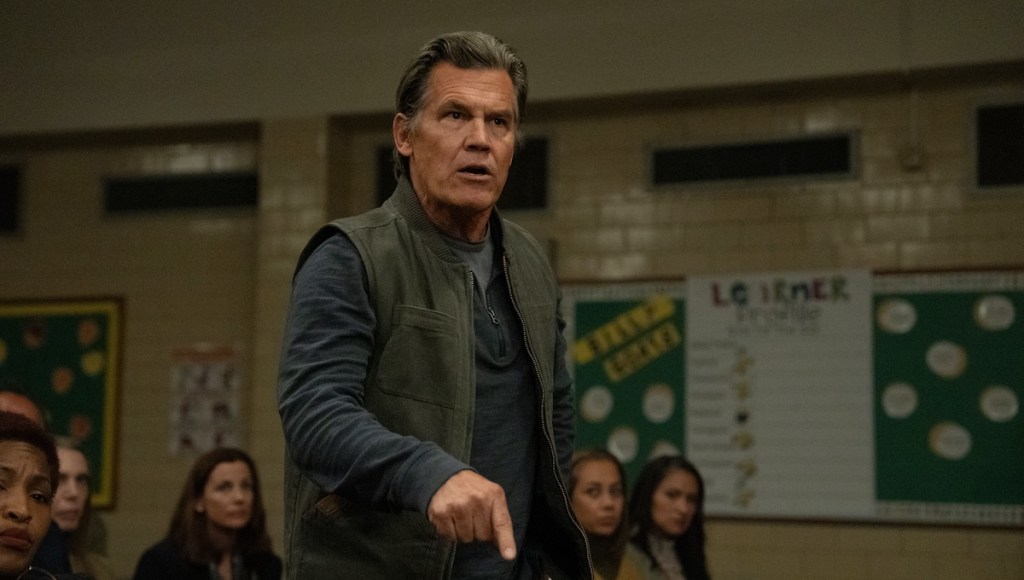
Weapons
Judging by this list alone, it’s evident that studios and production companies are leaning evermore on horror to produce successful original stories. But when those stories can be as twisted and satisfying as Zach Cregger’s new sleeper hit, Weapons, it is difficult to argue with the results. A follow-up (and perhaps shared universe crossover?) with Cregger’s Barbarian from 2022, Weapons focuses on a community torn asunder when all the children from a single elementary classroom awaken from their beds at 2:17 a.m. and vanish to parts unknown in the night.
Confidently told in a novelistic format with various characters leading their own chapters and narrative timelines—including the teacher of the class that disappeared (Julia Garner) and the father of one of the missing children who blames the instructor explicitly (Josh Brolin)—Weapons is a patient ensemble piece that at times better resembles a a studio drama from 20 years ago than a horror movie. Yet the true malevolence at play, and the subtle allusions about adults unable to protect their children from (ahem) weapons in the classroom, undergird what is a deeply troubling and satisfying sophomore effort.
